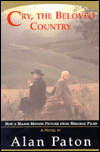
Cry, the Beloved Country
By Alan Paton
I read this searing book about apartheid in South Africa when I was in high school. It informed a whole generation's understanding of life in that country. Foreigners didn't know how South African families could become separated from one another, how the tribal life had been destroyed, or how the countryside couldn't support villagers. People weren't aware of the potential for violence over there. Paton's story about a black, country pastor who travels to Johannesburg in search of his wayward son, who has murdered a white man, is riveting.
By Alan Paton
I read this searing book about apartheid in South Africa when I was in high school. It informed a whole generation's understanding of life in that country. Foreigners didn't know how South African families could become separated from one another, how the tribal life had been destroyed, or how the countryside couldn't support villagers. People weren't aware of the potential for violence over there. Paton's story about a black, country pastor who travels to Johannesburg in search of his wayward son, who has murdered a white man, is riveting.
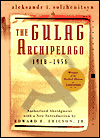
The Gulag Archipelago 1918–1956
By Aleksandr I. Solzhenitsyn
I spent most of my academic life studying the Soviet Union, and we all knew what terrible things took place in the labor camps. But until Solzhenitsyn's memoir, we had no firsthand account of the atrocities. His story encompasses so many aspects of the insidious system, from the unheated Leningrad prison cells and horrific physical abuse to the midnight arrests by the police and the denial by an entire population about the fate of neighbors who'd disappeared. He takes apart an enormous system—one based on inhuman suffering and torture—and you begin to see the individuals who populate it.
By Aleksandr I. Solzhenitsyn
I spent most of my academic life studying the Soviet Union, and we all knew what terrible things took place in the labor camps. But until Solzhenitsyn's memoir, we had no firsthand account of the atrocities. His story encompasses so many aspects of the insidious system, from the unheated Leningrad prison cells and horrific physical abuse to the midnight arrests by the police and the denial by an entire population about the fate of neighbors who'd disappeared. He takes apart an enormous system—one based on inhuman suffering and torture—and you begin to see the individuals who populate it.
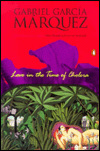
Love in the Time of Cholera
By Gabriel García Márquez
I loved reading this novel. In one sense, it's a straightforward tale of unrequited love, but it also has these gorgeous mythical parts. I liked it so much that when I met President Václav Havel, I gave him a copy, and he said, "I love having this, but I've already read it!" Later, I went to Colombia and met president Pastrana, who hosted a small dinner while I was there, and invited Márquez. Afterward, Márquez and I drove through Cartagena, and he pointed out places he'd written about in this book. He also told me that people think his stories are completely made up, but he said that they all bear some relationship to reality and that in his memoirs, he would explain who was who.
By Gabriel García Márquez
I loved reading this novel. In one sense, it's a straightforward tale of unrequited love, but it also has these gorgeous mythical parts. I liked it so much that when I met President Václav Havel, I gave him a copy, and he said, "I love having this, but I've already read it!" Later, I went to Colombia and met president Pastrana, who hosted a small dinner while I was there, and invited Márquez. Afterward, Márquez and I drove through Cartagena, and he pointed out places he'd written about in this book. He also told me that people think his stories are completely made up, but he said that they all bear some relationship to reality and that in his memoirs, he would explain who was who.
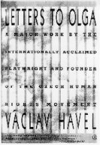
Letters to Olga
By Václav Havel
Of all of Havel's books, I particularly like Letters to Olga, because in addition to covering a lot of his philosophical ideas, it shows what it was like to be in jail—and that there were moments when he wasn't very heroic. I've since gotten to know Havel well. We are about the same age, and I wondered, 'What if I had stayed in Czechoslovakia? Would I have been arrested? What would I have been like in jail?' Those are the kind of questions that went through my mind reading this book.
By Václav Havel
Of all of Havel's books, I particularly like Letters to Olga, because in addition to covering a lot of his philosophical ideas, it shows what it was like to be in jail—and that there were moments when he wasn't very heroic. I've since gotten to know Havel well. We are about the same age, and I wondered, 'What if I had stayed in Czechoslovakia? Would I have been arrested? What would I have been like in jail?' Those are the kind of questions that went through my mind reading this book.
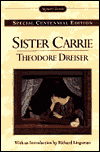
Sister Carrie
By Theodore Dreiser
I think many people are surprised that I like this novel; they imagine I have an overly glorified picture of America, having emigrated here from Czechoslovakia after World War II. But I actually don't have illusions about how difficult it is to make a life in a new place. Plus, I have always liked stories about an ordinary person that are epic in scope. I found Dreiser's descriptions of the industrial revolution and how it affected the opportunities available to people at that time very moving.
By Theodore Dreiser
I think many people are surprised that I like this novel; they imagine I have an overly glorified picture of America, having emigrated here from Czechoslovakia after World War II. But I actually don't have illusions about how difficult it is to make a life in a new place. Plus, I have always liked stories about an ordinary person that are epic in scope. I found Dreiser's descriptions of the industrial revolution and how it affected the opportunities available to people at that time very moving.
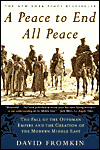
A Peace to End All Peace
By David Fromkin
President Clinton recommended this history of the Middle East to me, and if the president tells you to read a book, you do. Fromkin shows how these political states were set up artificially after World War I, and he traces the role of the West in negotiating each country's boundary. He covers the main historical events but also the bureaucratic intrigue: the relationships between the British and the French and how diplomats treated one another. When I was the secretary of state, I found that everybody thinks these crisis situations are the result of one bad decision, but as this book makes clear, our situation today isn't the result of a single choice. You start down a particular road, and then you take another little step, another little step—it's not as if there's ever a 'eureka' decision, one moment in time when you can look back and say, 'That's where it all went wrong.'
By David Fromkin
President Clinton recommended this history of the Middle East to me, and if the president tells you to read a book, you do. Fromkin shows how these political states were set up artificially after World War I, and he traces the role of the West in negotiating each country's boundary. He covers the main historical events but also the bureaucratic intrigue: the relationships between the British and the French and how diplomats treated one another. When I was the secretary of state, I found that everybody thinks these crisis situations are the result of one bad decision, but as this book makes clear, our situation today isn't the result of a single choice. You start down a particular road, and then you take another little step, another little step—it's not as if there's ever a 'eureka' decision, one moment in time when you can look back and say, 'That's where it all went wrong.'




